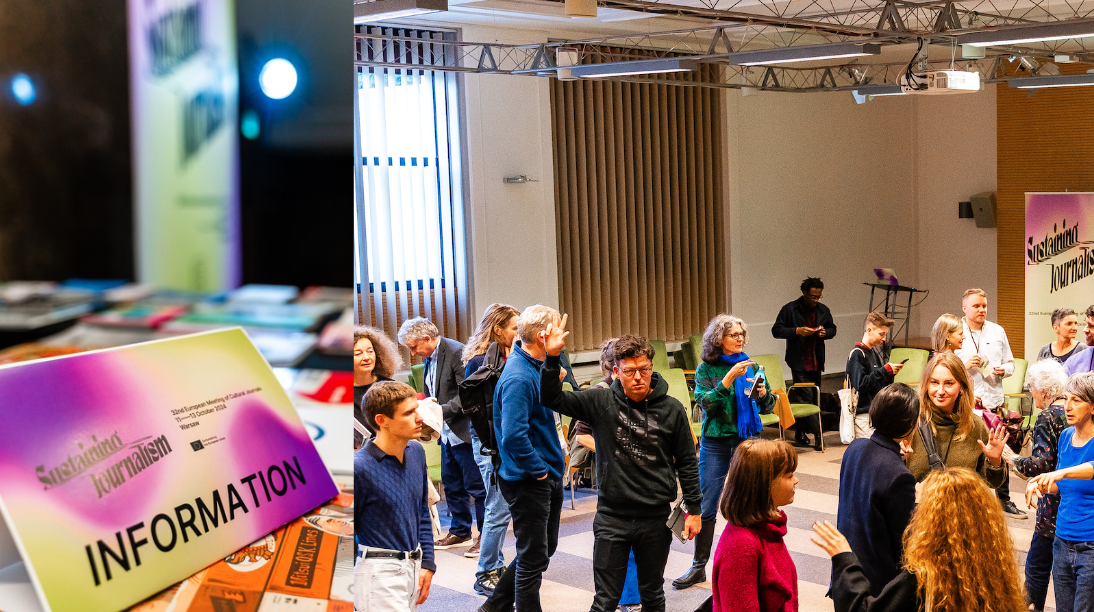
The Courts have acquiesced, the populace is compliant and the Democratic Party is splintered. Without any way to make their opposition felt, Trump’s opponents’ only hope is that the economy will cause MAGA voters to rethink.
Viewing authoritarianism as a political trend overlooks the damage it can cause. The devastation ‘illiberal democracies’ are inflicting on cultural and media sectors show just how difficult it is to recreate something once it has been taken apart. Eurozine partners discuss ways to sustain journalism at the 32nd European Meeting of Cultural Journals.
Hybrid regimes, illiberal democracies, democraship, democratura: these are all slightly terrifying new terms for governments drifting towards authoritarianism around the globe. We have been used to seeing the world through the binary geopolitics of the more-or-less democratic free world on one side, and the straightforward dictatorship on the other. But what is Hungary under Viktor Orbán? Or Narendra Modi’s India? And, as the world comes to terms with the reality of President Trump’s second term, will America itself become a hybrid regime dominated by tech oligarchs and America First loyalists?
At a recent conference in Warsaw held by Eurozine, a network of cultural and political publications, Tomáš Hučko from the Bratislava-based magazine Kapitál Noviny, told the dispiriting story of his country’s slide towards populist authoritarianism. The Slovak National Party, led by ultranationalist Prime Minister Robert Fico, drove a coach and horses through media and cultural institutions, he explained, beginning with the Culture Ministry itself. Fico then changed the law to take direct control of public radio and TV. The heads of the Slovak Fund for the Promotion of the Arts, National Theatre, National Gallery and National Library were all fired and replaced with party loyalists. A ‘culture strike’ was met with further attacks on activists and critics of the government. ‘There were constant attacks on the journalists by the Prime Minister including suing several writers,’ said Hučko.
Fellow panellist Mustafa Ünlü, from the Platform 24 (P24) media platform in Turkey spoke of a similar pattern in his country, where President Erdoğan’s government has withdrawn licences from independent broadcasters.

The 32nd European Meeting of Cultural Journals on Sustaining Journalism. Photos taken by Reedy Media Group.
It is tempting to suggest that these illiberal democracies are a passing political trend. But the problem, according to several Eurozine delegates, was that such regimes have a tendency to hollow out the institutions and leave them with scars so deep that they are difficult to heal. Agnieszka Wiśniewska from Poland’s Krytyka Polityczna, a network of Polish intellectuals, sounded a note of extreme caution from her country’s eight years of rule under the Catholic-aligned ultra-right Law and Justice Party. Although the party was beaten by Donald Tusk’s centrist Civic Coalition in last year’s elections, the damage to democracy has been done. ‘There is the possibility of reversing the decline,’ said Wiśniewska. ‘But the state media was turned into propaganda media.’ In part, she blamed the complacency of politicians such as Tusk himself: ‘Liberals didn’t care enough,’ she said.
Writing on contemporary hybrid regimes in New Eastern Europe, an English-language magazine which is part of the Eurozine network, the Italian political scientist Leonardo Morlino identifies a key moment in July 2014 when the Hungarian leader Viktor Orbán began using the expression ‘illiberal democracy’.
He later clarified what he meant by this: that Christian values and the Hungarian nation should take precedence over traditional liberal concern for individual rights. For Morlino, however, Hungary is not the only model of hybrid regime. He provides an exhaustive list of countries in Latin America (Bolivia, Colombia, the Dominican Republic, Ecuador, Guatemala, Haiti, Honduras, Mexico and Paraguay) with ‘active, territorially widespread criminal organisations, high levels of corruption and the inadequate development of effective public institutions’ where democracy is seriously weakened. Meanwhile, in Eastern and Central Europe he recognises that Russian influence has created the conditions for hybrid regimes in Armenia, Georgia, Moldova and even Ukraine.
The term ‘democratura’ comes from the French ‘démocrature’ and combines the concepts of democracy and dictatorship. In English this is sometimes translated as ‘Potemkin democracy’, which in turns comes from the phrase ‘Potemkin village’, meaning an impressive facade used to hide an undesirable reality. This is named after Catherine the Great’s lover Grigory Potemkin, who built fake show villages along the route taken by the Russian Empress as she travelled the country.
It is tempting to suggest Donald Trump is about to usher in an American Democratura, but none of these concepts map neatly onto the likely political context post-2025. The USA cannot be easily compared to the fragile democracies of the former Soviet Union, nor is it equivalent to the corrupt hybrid regimes of Latin America. It is true that Trump’s former adviser Steve Bannon liked to talk about ‘illiberal democracy’ but more as a provocation than a programme for government.
And yet, there is an anti-democratic tone to the language used by Trump’s supporters. In the BBC series on US conspiratorial ideology, The Coming Storm, reporter Gabriel Gatehouse noticed the increasing prevalence of the right-wing proposition that the USA is a ‘constitutional republic’, not a democracy. This line of thinking can be traced back to an American ultra-individualist thinker, Dan Smoot, whose influential 1966 broadcast on the subject can still be found on YouTube. Smoot was an FBI agent and fierce anti-Communist who believed a liberal elite was running America as he explained in his 1962 book, The Invisible Government, which ‘exposed’ the allegedly socialist Council on Foreign Relations.
Such rhetoric is familiar from the recent election campaign, which saw Donald Trump attacking Kamala Harris as a secret socialist and pledging to take revenge on the ‘deep state’.
But there are worrying signs that Republicans under Trump will be working from an authoritarian playbook. As The Guardian and others reported this week, an attempt to pass legislation targeting American non-profits deemed to be supporting ‘terrorism’ has just been narrowly blocked. Similar laws have already been passed in Modi’s India and Putin’s Russia.
Trump has consistently attacked critical media as purveyors of fake news. He has suggested that NBC News should be investigated for treason and that ABC News and CBS News should have their broadcast licences taken away. He has also said he would bring the independent regulator, the Federal Communications Commission, under direct Presidential Control. In one of his more bizarre statements, he said he wouldn’t mind an assassin shooting through the ‘fake news’ while making an attempt on his life.
Whether a Trump administration emboldened by the scale of the Republican victory will seriously embark on a project to dismantle American democracy is yet to be seen. The signs that the President has authoritarian proclivities are clear and he has made his intentions towards the mainstream media explicit. Hybrid democracy may not quite be the correct terminology here. We may need a whole new lexicon to describe what is about to happen.
This article was first published online on Index on Censorship, 14 November. You find it here. It then appeared in Volume 53, Issue 4 of Index on Censorship’s print magazine, released on 12 December, titled Unsung Heroes: How musicians are raising their voices against oppression. You can read more about the issue here.
Published 20 November 2024
Original in English
First published by Index on Censorship
Contributed by Index on Censorship © Martin Bright / Index on Censorship / Eurozine
PDF/PRINTSubscribe to know what’s worth thinking about.

The Courts have acquiesced, the populace is compliant and the Democratic Party is splintered. Without any way to make their opposition felt, Trump’s opponents’ only hope is that the economy will cause MAGA voters to rethink.

Elected in 2022 on a wave of popular hope, Colombia’s leftwing leader Gustavo Petro has failed to negotiate peace with the country’s armed groups and embarked on a ruinous tariff war with Donald Trump. A portrait of the president hampered by his own revolutionary nostalgia.